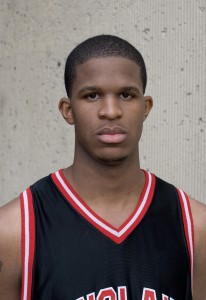 Thinking his team just lost a pick-up game at one of Sinclair Community College’s open gyms, former Sinclair basketball star Mark Anderson sits on the gym floor anxious to finally tell his side of the story when teammate Damon Dillard yells, “What are you doing getting interviewed right now, Mark! We’re still playing!”
Thinking his team just lost a pick-up game at one of Sinclair Community College’s open gyms, former Sinclair basketball star Mark Anderson sits on the gym floor anxious to finally tell his side of the story when teammate Damon Dillard yells, “What are you doing getting interviewed right now, Mark! We’re still playing!”
Anderson gets back up to play and his team proceeds to win four straight games. He still wears the red and white he sported just a year ago when he was an All-American for the Tartan Pride, but it’s no longer a Sinclair uniform. With his eligibility gone, the shorts are Jordan and the shirt is Fruit of the Loom. After going undefeated in seven games Anderson finally sits down to talk. Between losing a scholarship to Miami University and being criticized in the media, it’s been a tough year for the former Sinclair basketball star.
“I just want people to know that I wasn’t as stupid as the media made me out to be,” Anderson said about a May 12 2009 article in the Dayton Daily News that suggested he lost his scholarship due to poor academics. “I don’t get bad grades; I’m not an F student. I never have been and I never will be.”
Hitting some road blocks
Anderson said the real reason he was unable to transfer was because he only had “sixty something” credits instead of the 94 that were required.
“It’s hard to (get 94 credit hours) in two years. When you’re trying to graduate up out of (Sinclair) and go Division I (in two years), you got to take as many (credit) hours as possible,” he said. “If I could go back I would have taken 18 hours max both summers.”
After realizing that Miami was out of the picture, Anderson signed a letter of intent to play for the University of Charleston in West Virginia, but the NCAA caught him by surprise.
“Out of nowhere a new NCAA rule change came in saying that you had to have passed so many (credit) hours during spring quarter because for some reason they don’t count summer as a regular quarter, they count it as extra quarter,” he said. “I was prepared to take and pass as many (classes) as I needed to get down there, but then that rule came out and I was like, ‘Man what am I suppose to do now?’ It was like I hit another road block.”
Not giving up
Feeling frustrated and disappointed that he couldn’t transfer, Anderson said he tried to keep his emotions bottled up inside until someone gave him advice that really hit home.
“I’ll never forget when I was sitting down in the athletic office and there was a tap on my shoulder,” Anderson said. “It was Ms. Peavy. I guess she had just got news about what was going on and she told me, ‘Don’t quit, you’re not going to be considered a failure unless you quit. Move on from this, start fresh and stay focused.’ ”
Inspired by those words along with the support from his family, Anderson said his mindset improved dramatically. Upon the advice of Sinclair basketball coach Jeff Price, Anderson re-enrolled in classes at Sinclair.
“I had got word from coach (Price) that a lot of Division II schools were interested in me and that I needed to just come back (to Sinclair) and take care of a few classes,” he said. “I still had some Division I offers, but with how the NCAA works I would have only had one year of eligibility so I said whatever, I’ll just go to Division II so I can have two years (of eligibility).”
Majoring in Physical Education, Anderson took classes part-time both fall and winter quarters and said his grades were good. With his academics solid, Anderson said he currently has offers from Walsh University, Urbana University, Saginaw Valley State University and Glenville State University. He plans on making a choice on which school he will attend by the middle of spring quarter so he can take summer classes and work out with the team at the school he chooses. Anderson said there’s just one more thing he has to do before he transfers.
“Right now I’ll admit that my game isn’t as sharp as it was because I wasn’t really playing ball much during winter quarter,” Anderson said. “It’s just about getting my timing and my wind back, just the little things like that that go away when you don’t play for a little bit no matter how good you are.”
Anderson said while this last year has been tough, he used it as a learning experience.
“The biggest lesson I learned from all of this is don’t take anything for granted and listen to the ones that are in your circle because they’re not going to steer you wrong. Just know who your real people are that will stick with you no matter what you are going through.”

